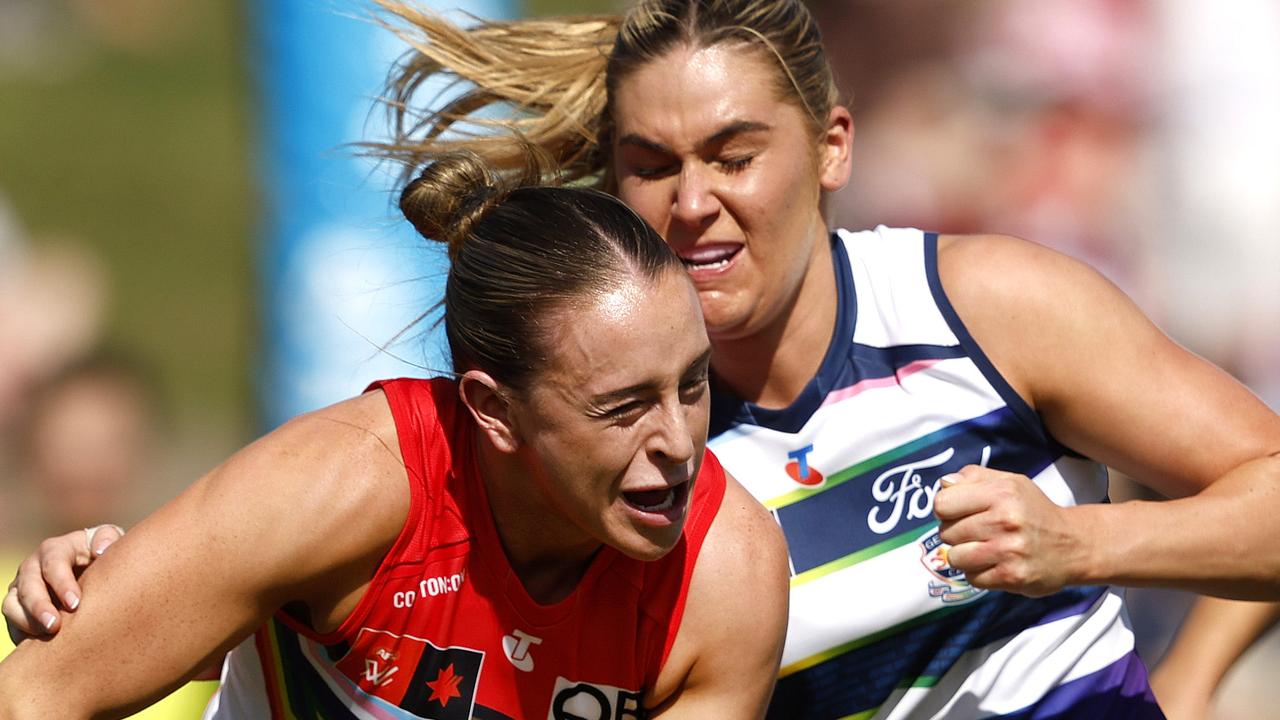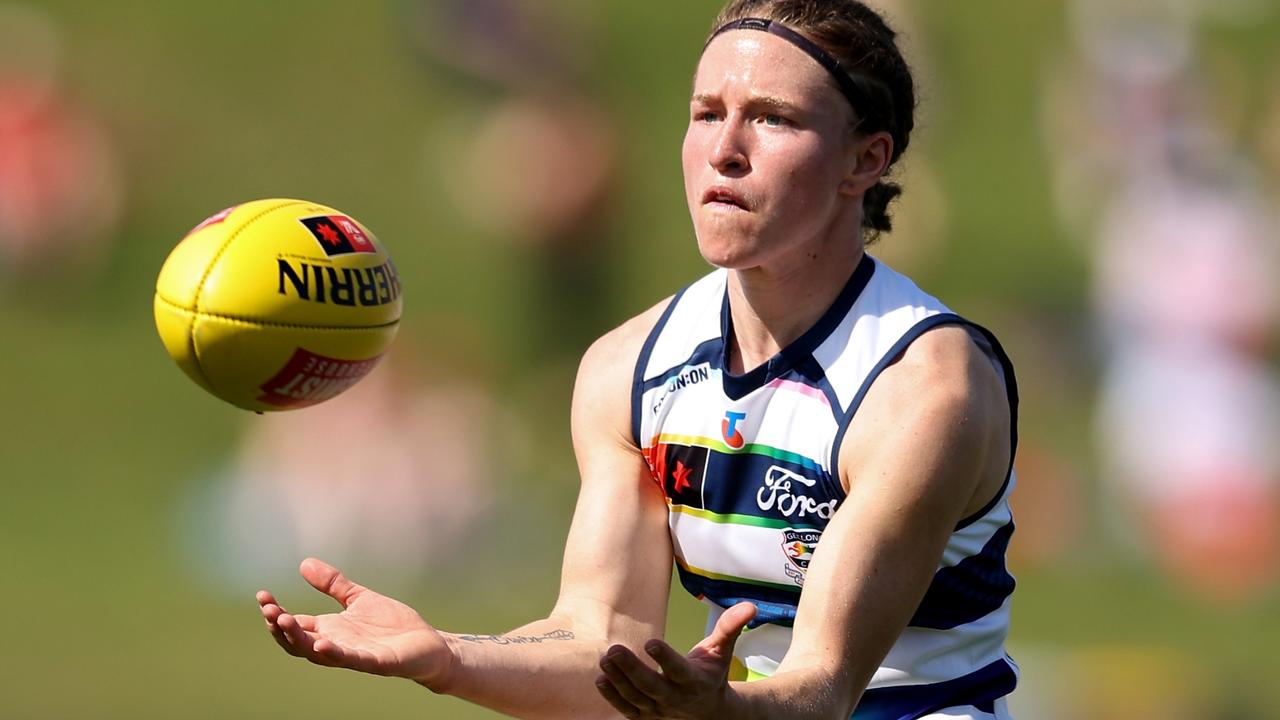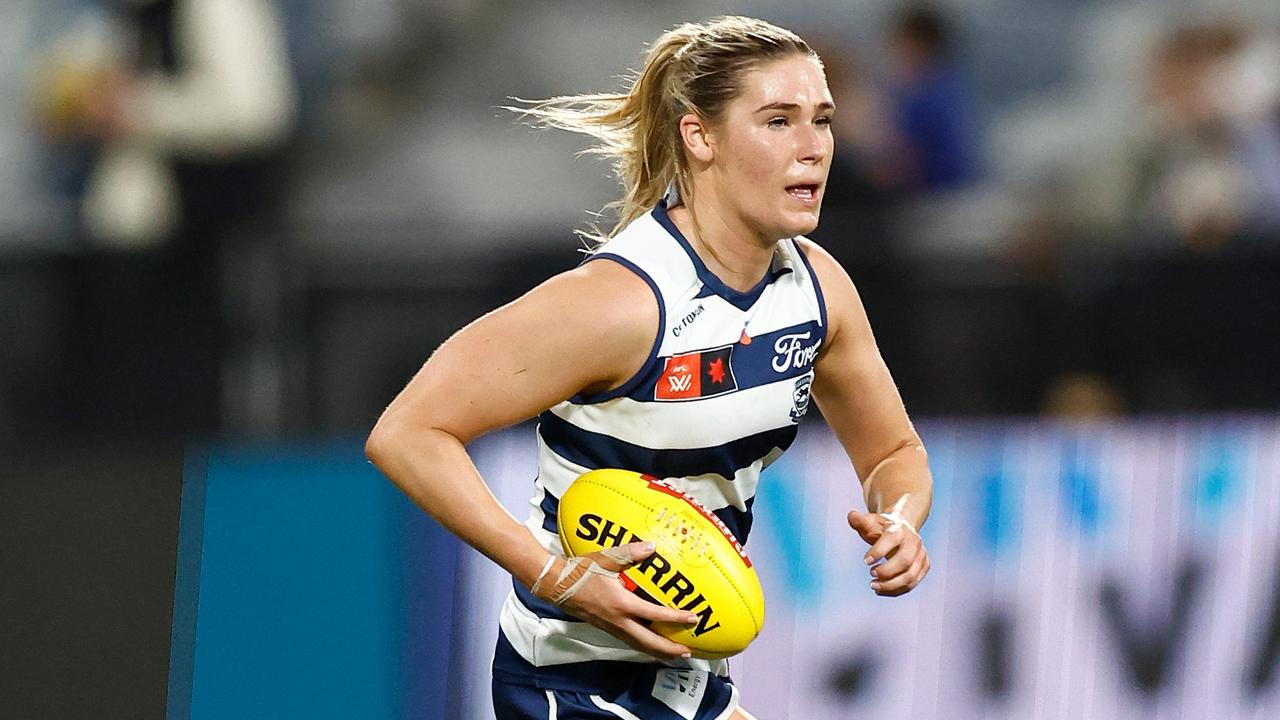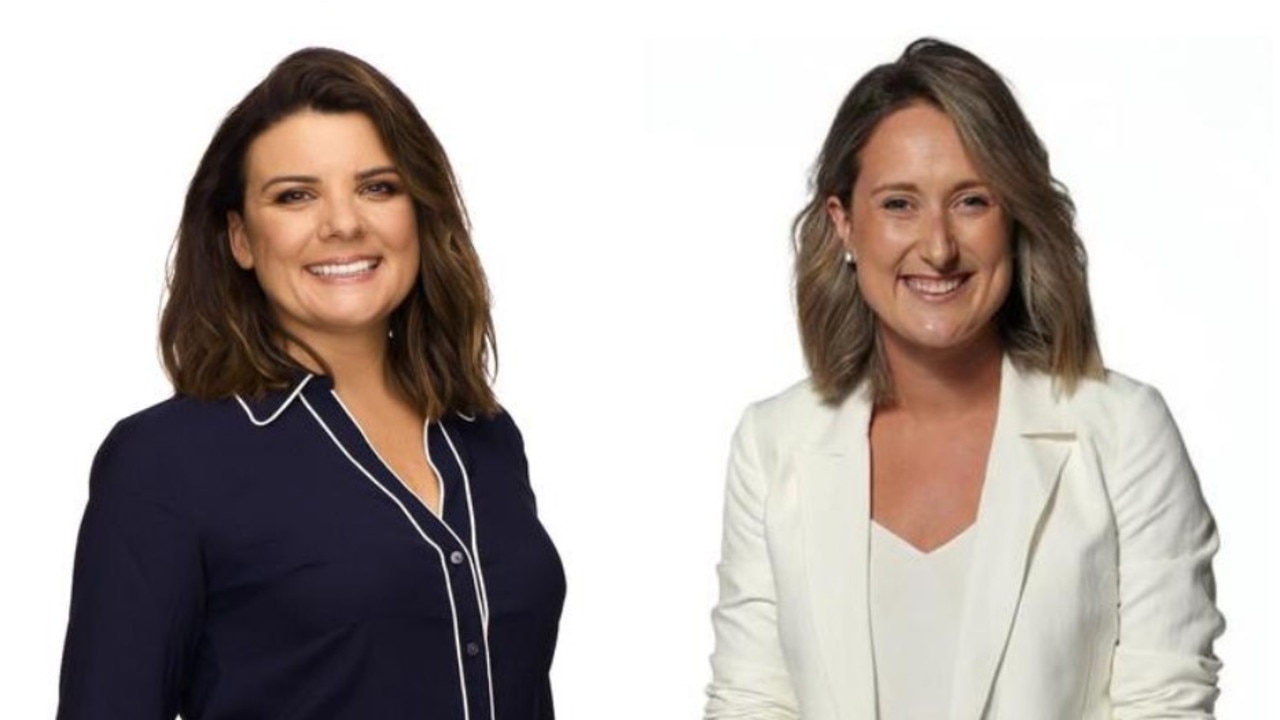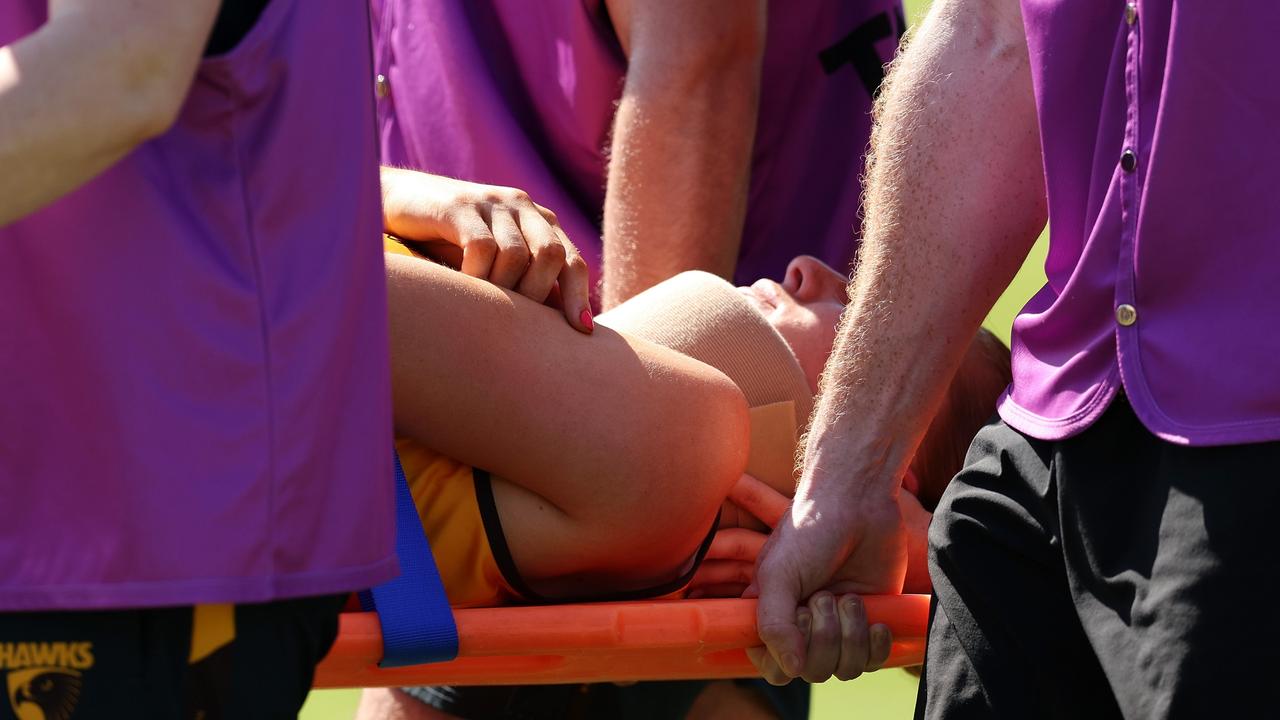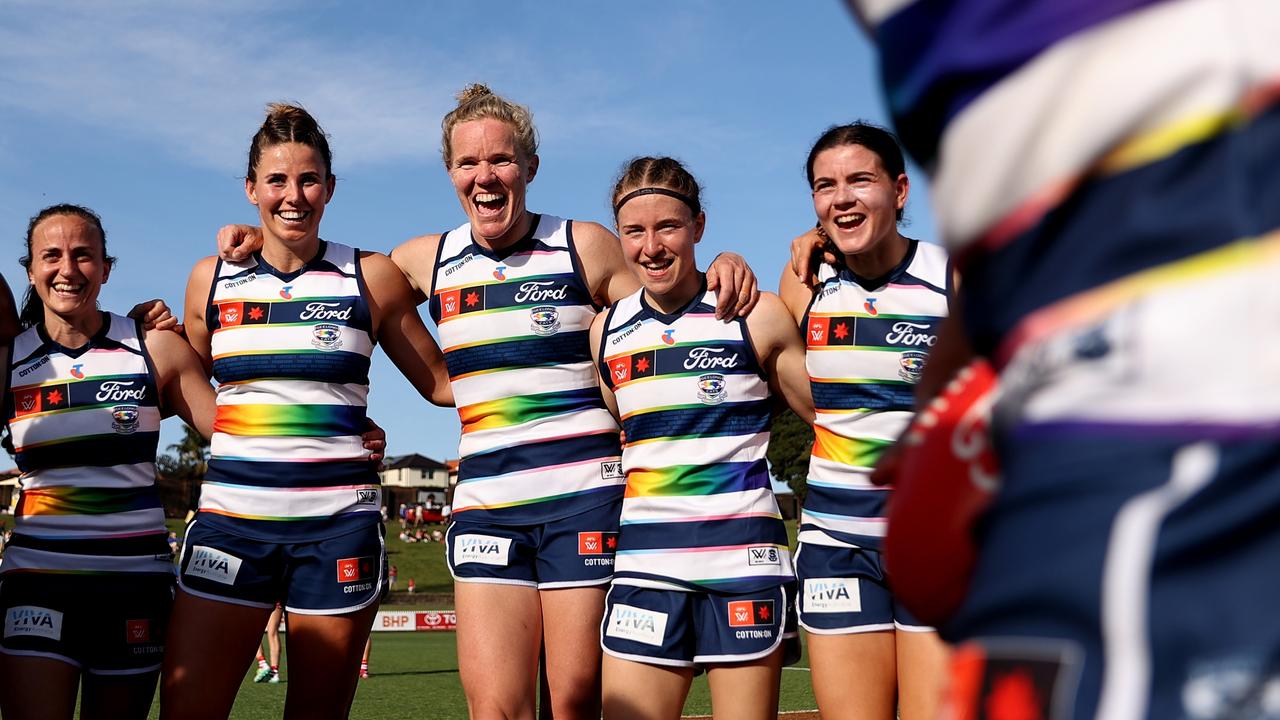The Soda Room podcast: Crows captain Chelsea Randall tells how she’s inspired by criticism
Adelaide Crows AFLW captain Chelsea Randall is brought to tears as she explains how even her own teammates were embarrassed to have her in their side. Listen to the podcast.
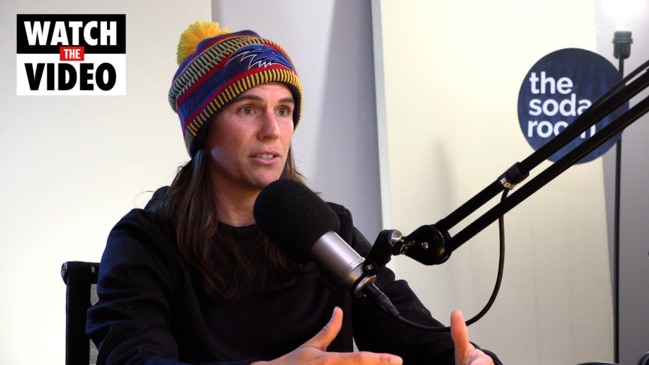
AFLW
Don't miss out on the headlines from AFLW. Followed categories will be added to My News.
Adelaide Crows AFLW captain Chelsea Randall has opened up about coming out to her family, her relationship with teammate and life partner Marijana Rajcic and the mental scars she still carries from being laughed at because she was a girl before her first game.
In an emotional interview on a new podcast The Soda Room, Randall reveals the turmoil she went through as a teenager telling her parents she was gay.
The WA native recalls driving an hour to break the news to her father, but being unable to find the words before getting back in her car and starting to drive home.
“Dad called me and I was on the freeway and he goes: ‘Was there something that you really wanted to tell me today?’,” she tells interviewer Mark Soderstrom.
“I just burst into tears. I was like: ‘Dad, I think I like girls. I hope you still love me. I hope you still accept me for who I am. I haven’t changed as a person.”
SCROLL DOWN TO LISTEN TO THE PODCAST
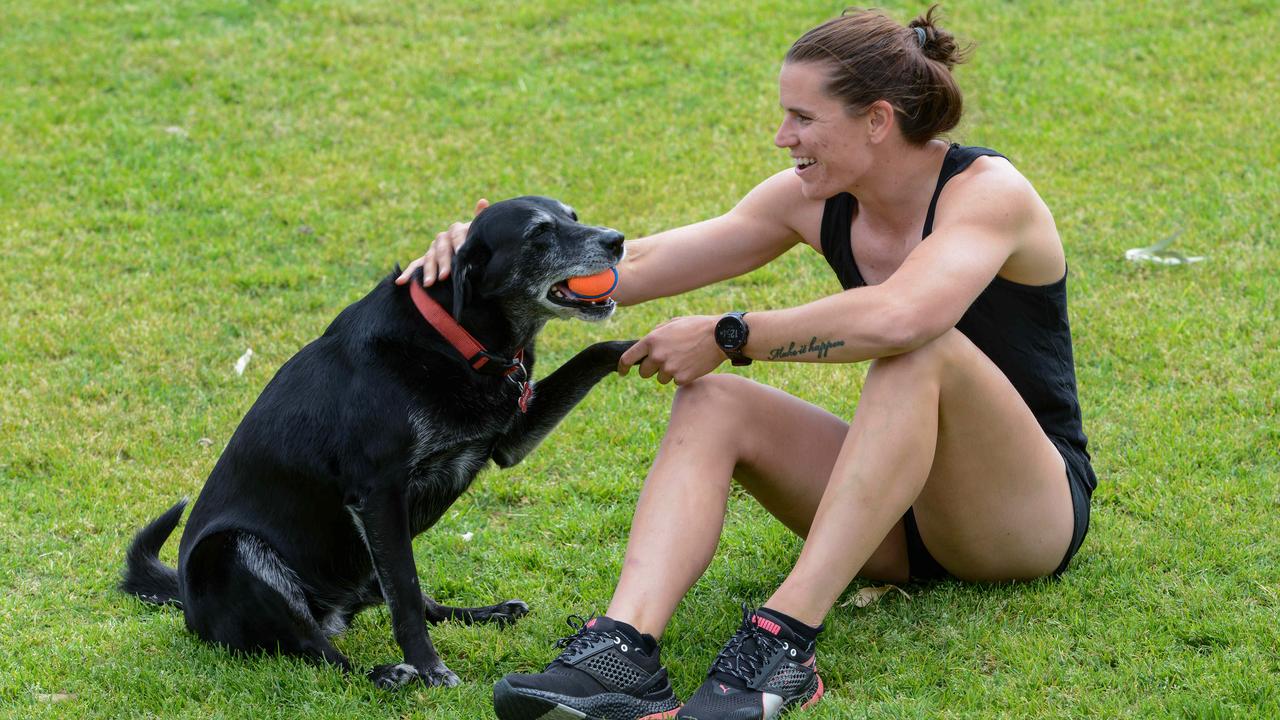
Randall says her father, mother and brother, were all very supportive when she came out to them, but not everyone in the rainbow community was as fortunate.
But she said she faced a quandary when she and Rajcic became a couple, because they were teammates.
“It was, yeah, a really, really difficult scenario for us both, because … I’m an overthinker,” she said.
“I was like, ‘No, I’m not dating a teammate. I’m not doing that. That’s not … You know, think about the team dynamics, what happens if it doesn’t work out? Like, you know, I’m a leader, this is not something that I want to … follow through’.”
But she said she couldn’t be happier with the way their relationship had worked out.
Randall said she was “really hurt” as an 11-year-old when she was lining up as the only girl before her first game of football in an under-age boys competition.
“Everyone was nudging each other and just laughing under their breath at the fact that I was a girl in their team,” she said.
“And you could see the boys in my team were embarrassed that I was in their side. They were like ‘we’ve got a girl in our team and everyone is laughing at us’.
“It’s bringing me emotion just thinking about it. Spot should just be for anyone and everyone, and to not feel welcomed, or treated the same, when all I wanted to do was just play, was hard for a young girl.”
“The truth is it really hurt me. And it drove something inside of me that I never wanted any other young girl or person to ever feel like they don’t belong.”
Randall said she made a mental note of the opposition player laughing the hardest, and when he picked up the ball during the game, she tackled him hard into the ground and won a free kick for holding the ball.
“And I thought: ‘Yeah, I kind of like this game. Gotcha. Let that be a statement, I’m here to stay and I want to play just like you guys.”
CHELSEA RANDALL SPEAKS TO MARK SODERSTROM IN THE SODA ROOM
The Soda Room is presented in collaboration with The Sunday Mail.
Below is an edited transcript of the podcast – listen in full in the player above.
Mark Soderstrom: I’m really excited to hear your story. So tell us as a youngster, when did football cross your path?
Chelsea Randall: So, footy crossed my path quite early, I guess I was probably five or six. When I started watching my brother play footy. I was always on the sidelines kicking the ball.
But it was only when I turned 11 that I started actually playing. And how I fell into that was, I guess, a bit unusual because I was asked to fill in for a boys’ team. Back then it was really uncommon that you’d see girls playing football. It wasn’t really normal.
And so when one of the coaches asked me if I wanted to fill in for the boys, it was like, Oh, am I, am I allowed to? Asked Dad and Dad was like, ‘Yeah, go for it’. He was always really supportive of me.
Mum was pretty against it to begin with. She really didn’t want me to play. She didn’t want me to get hurt. So I think Dad managed to convince Mum. And yeah, I played my first game of footy. But let’s just say I wasn’t very welcomed.
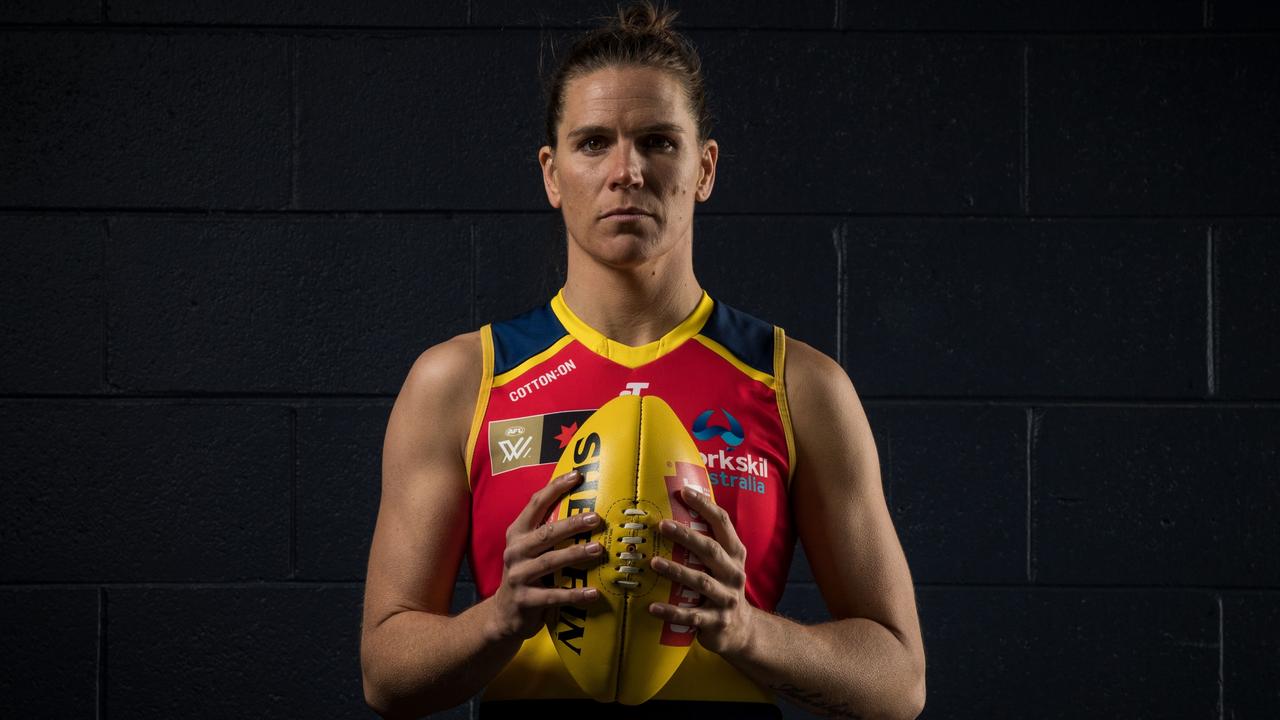
MS: Let’s talk about this first game, because I do know your story with this. So you line up. You’re the only girl on either side?
CR: Yeah, basically, I was the only girl – I had my little ponytail. And you faced the opposition to begin the game and umpires check your nails and boots, and all the opposition players spotted me and I didn’t realise what was going to come next … And that was laughter, pointing, and everyone nudging each other and just laughing under their breath at the fact I was a girl in their team.
And you could see the boys in my team were embarrassed that I was in their side, that they were like: “We’ve got, we’ve got a girl in our team, and everyone’s laughing at us.” And so how that made me feel was … I can’t even quite describe it. Like, it’s, it’s bringing me emotion. Thinking about it. Like, you know, sport should just be able to be for anyone and everyone and to not feel welcomed, or treated the same, when all I wanted to do was just play, was hard for a young girl.
MS: I’m watching you now, I can see the emotion in your face. This is 20 years ago but it’s still a really, really strong feeling. It had a huge impact?
CR: Yeah, it really does. And I don’t probably get emotional when I share the story because I share it more so for the funny side of what I guess I did next.
But the truth is that really hurt me. And it drove something inside of me that I never wanted any other young girl or person to ever feel like they don’t belong.
And I guess that kind of started my journey in being really strong in valuing inclusivity but yeah, from that point, I guess I just picked the boy that was laughing the hardest.
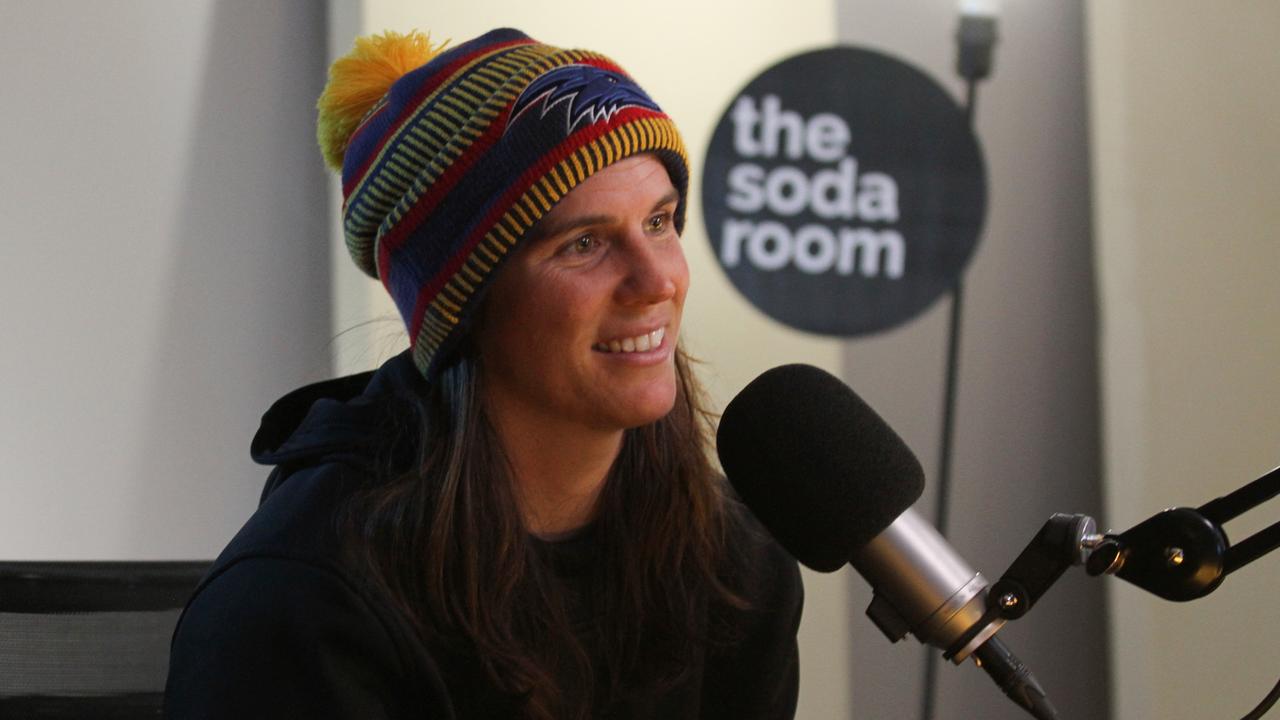
MS: So you’ve got all these feelings welling up, the game starts …
CR: Yep, game starts and I remember the boy that was laughing the hardest. And I thought I’m gonna make a statement here. He picked up the ball and I tackled him into the ground and pinned him for holding the ball.
And I thought: “Yeah, I kind of like this game. Gotcha. Let that be a statement. I’m here to stay. And I want to play just like you guys.”
MS: Can I say that that impact and what it’s had on you is reflective in the way you play footy. You play football with absolute intensity and passion and no regard for your body like nobody I’ve ever seen. And it’s evolved out of perhaps those early moments?
CR: Yeah. So every season, you would try to earn respect from the boys in your team. I hated it when the coach would say “jump into pairs”. Because no one ever wanted to be my partner. No one ever wanted to be with the girl. And I’d always be stuck with the assistant coach or whatever it might be.
So I’m really conscious of that as becoming a teacher as well that you might sometimes have to facilitate people into pairs. And yeah, and so that was interesting.
But at the age of 13, could no longer play boys football. And I was lucky, I got permission, a special permit to play in the Safety Bay Stingers women’s team. So as a young 14-year-old, there was no female footy pathways, no youth girls, no junior girls, no people my own age. So I had to play with people that are in their 20s or 30s.
MS: You have been really, really pumped. I mean, that’s a great acknowledgment early on, especially the senior level.
CR: Yeah, well, it was very different to the women’s footy. My first year in doing that, it was made up of the senior men’s girlfriends and some family members that have always wanted to play footy, but they’d never kicked a ball really before they’d never played the game.
And so the squeals and the giggles, you know, really occurred and to me, I was like, “Don’t do that”. Because I’ve been trying to fight my way into the boys. And I’ve been laughed at for like three years straight. Don’t. Don’t giggle and run away from the ball or scream. What kind of image are you giving us girls who really want to play this game and taking this seriously.
MS: You’ve won three AFLW premierships. There’s only been five because of the Covid year there was no grand final. So the second one, you win when there is 53,000 people at Adelaide Oval. Being at the ground. It was one of the most memorable games of football and crowds I’ve ever seen.
CR: When they put the final, official attendance up on the screen, and at the time, I’d actually just come to the bench for a rotation to get a rest and it popped up with 53,034.
And I remember getting out of my seat, this is in the middle of a grand final, and I honestly just raised my hands up over my head and did a 360 just to everyone like behind me in the crowd with the biggest smile.
We were lucky, we were in front at the time … but I think even if we were losing, like, my God, it was a moment where, for me, I felt like finally worthy enough, I felt, yeah, respected enough. And after everything you go through … imagine from the age of 11 years old, basically, up until that point, every weekend I’d played football, the comments I would encounter of parents even saying to my own parents, like: “What are you doing, letting your daughter play?” and “This is a boys sport”.
And so they’re dealing with that. I was dealing with comments like: “Go back to the kitchen”, as I got a little bit older, like, “This is pathetic, like, go and play a female sport”, like just every ordeal every weekend, you would cop some kind of, like, comment that you just be like …
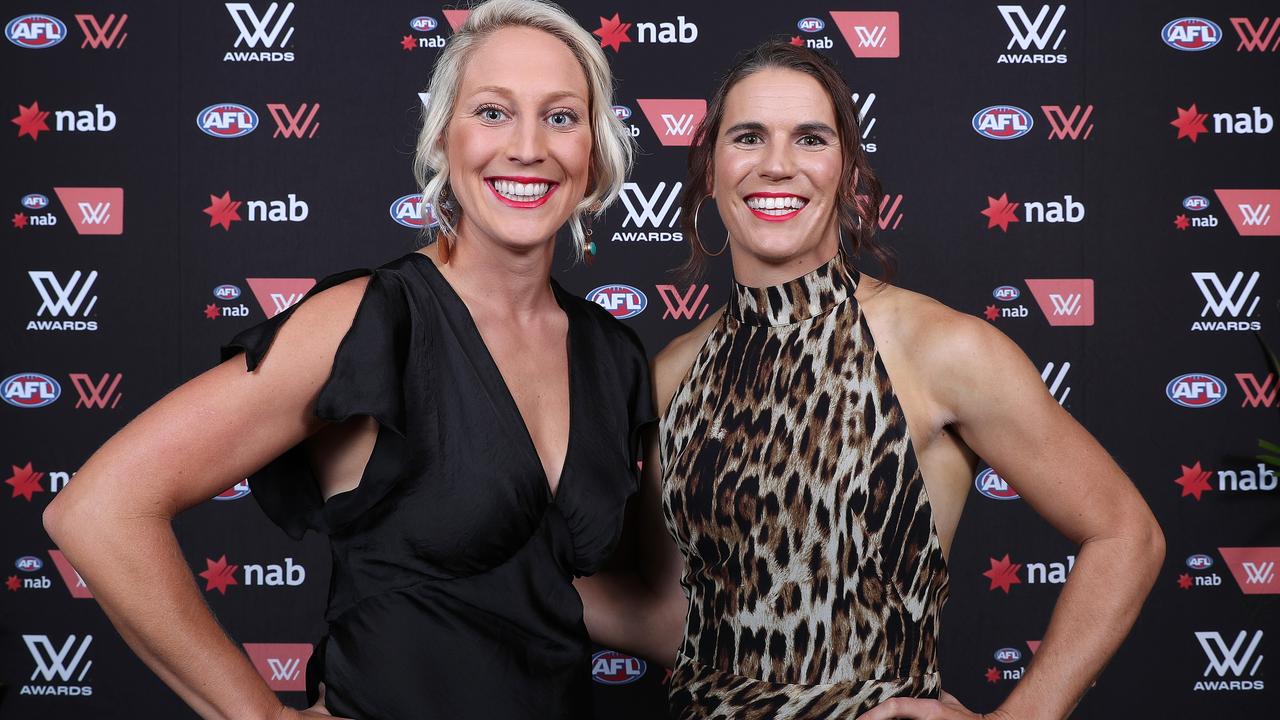
MS: Let’s talk about MJ (Marijana Rajcic). She’s your premiership teammate and now she’s your life partner. Yeah, the inclusivity I think of the AFLW. And how it embraces diversity, right across the board, I think has helped people understand completely different decisions, situations and lifestyles in more of a mainstream role. Would that be fair enough to say?
CR: Hopefully, like, I can see how society has changed in that space. But again, you know, I mean, you’re dealing as a female playing in a male-dominated sport, let alone throw in now you’re a part of, you know, the LGBTIQA+ group, or the rainbow community which is probably easier to say.
That was challenging in itself. In its very first year, I was very afraid on public, like, social media. I wasn’t, you know, advertising as such that I was in a gay relationship, because I was already seeing that people, some people, were hesitant about female footballers already and saying some negative things. I didn’t want to give them another thing to just hate on us. And, unfortunately, that’s the space a lot of people in the rainbow community live in, fearing not being accepted again.
I remember when I came out to my parents, that … was difficult. My parents split up when I was 12. And so I remember, I remember telling my, or wanting to tell my dad, and I drove all the way down from Mum’s house (about an hour) down to Dad’s. And I was just, I was like: “Just got to tell him”. I think I was about 18-19. I was like: “You’ve just got to tell him” and I couldn’t get the words out. And so I drove away.
And then Eve, my stepmum had actually said to my Dad, I think she really wanted to tell you something. You need to call her. And Dad called me and I was on the freeway going back and he goes, “Was there something that you really wanted to say to me today?”
And I just burst into tears. And I’m like, I was like: “Dad, I think I like girls. I hope you still love me. I hope you can still accept me … for who I am, I haven’t changed as a person.” Yeah, and all of those things.
And um, yeah, Dad was really supportive. I’m so lucky that I’ve got such supportive family in that regard. Some people’s stories aren’t exactly like that. Some of my friends were kicked out of homes, left on a street. Some abused.
Yeah, it’s just, it’s really quite a difficult situation a lot of young people are trying to find their identity. And sometimes society just makes it hard for them to be themselves.
And that’s why I think having such strong, diverse role models in our society is so important. Because I never really had them growing up. And if I did, that, maybe I would have seen that it’s, it’sOK. That it’s a bit more normal.
MS: It is OK. And it is normal. And obviously your dad knew that too, didn’t he?
CR: He did. And you know … for some reason, telling my brother was even harder and he just knucklehead sandwiched me. And said: “You tosser, of course, I love you.” And he’s like, “I’ve already known for years.”
MS: So your brother knew. Did your mum say she knew?
CR: I think it’s … it’s different for everyone, I guess, everyone’s coming out story, but it is weird.
You never stop coming out. You know, like, I wish straight people had to go to their parents and go: “Look at the dinner table is something I really want to say to you. Mum, Dad. I’m straight. I’ve got a boyfriend. I’m really sorry. I hope you still love me.”
There’s just nothing like that.
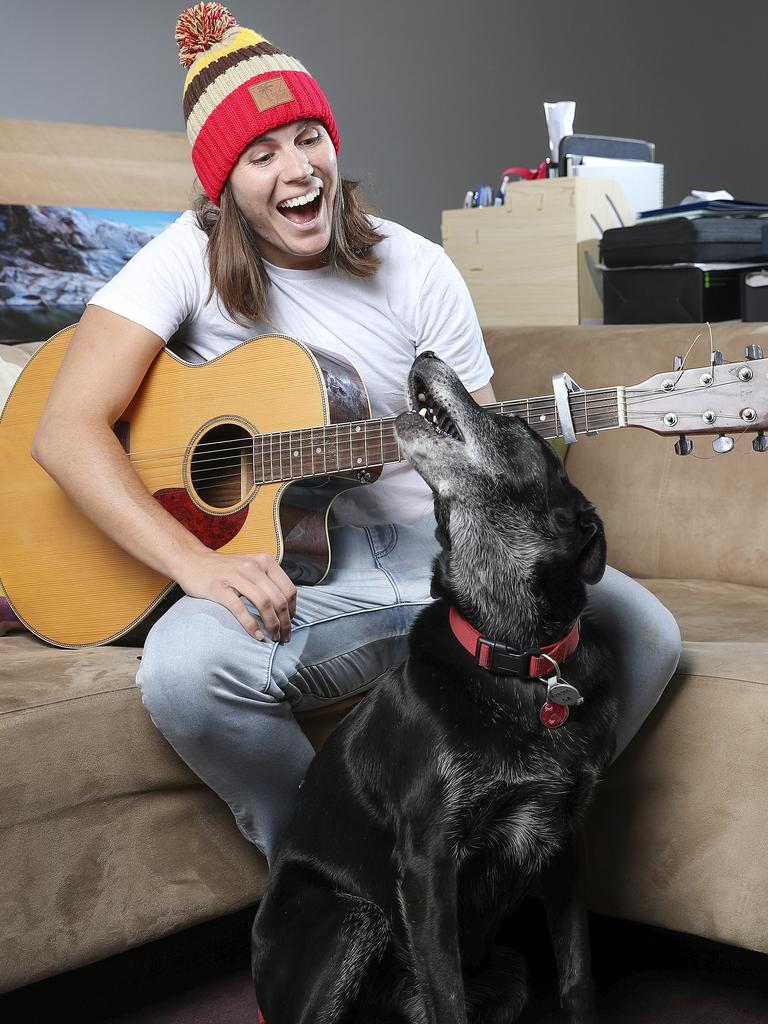
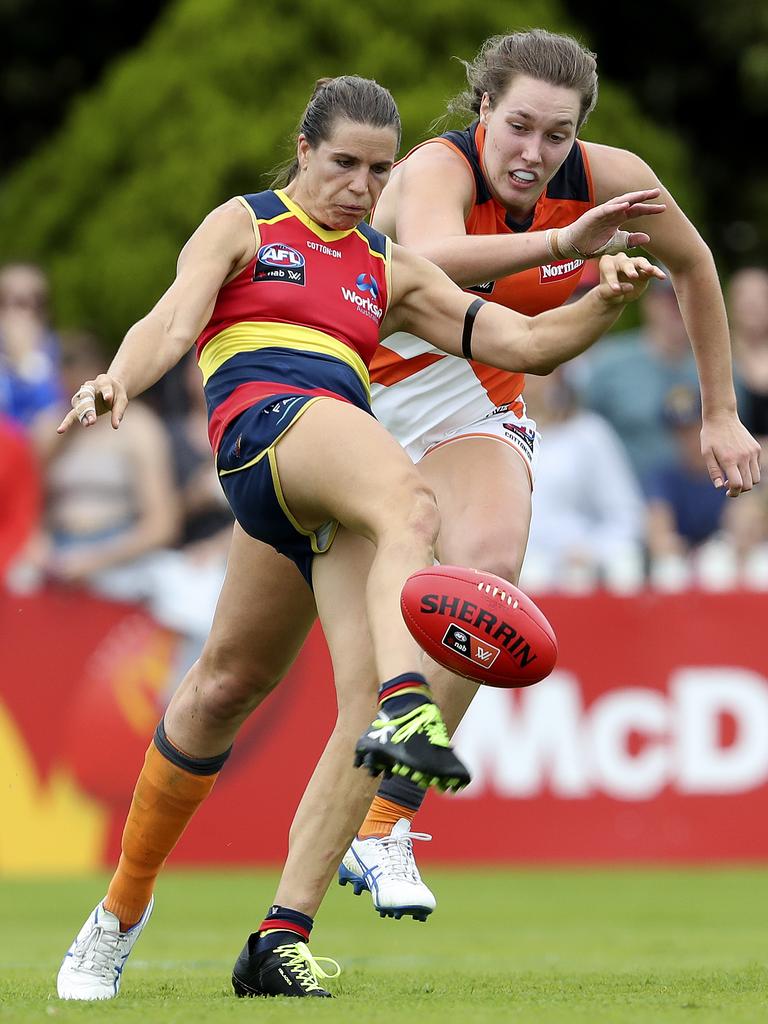
MS: It’s a good point, because it seems such an emotionally powerful thing to have to do. And I can see your reaction, Chelsea, you know, and I thank you so much for, for sharing, you know who you are and that story. But you can see it’s such an emotional situation to go through.
CR: Oh, massively. Suicide rates for people in the rainbow community. I don’t have them in front of me but it’s just, you know, phenomenal.
And so not everyone’s story is the same. But nine times out of 10. You know, for our rainbow community, a lot of support is out there. And that’s why footy is so important as well, because it’s a network of, it’s a second family. And for some people, it’s everything that they have.
MS: MJ, I imagine you two must be bloody great support for each other.
CR: Yeah, it’s interesting. We’re obviously teammates as well and met through football and stuff. And it was, yeah, a really, really difficult scenario for us both, because any thought that any individual has, I had them tenfold.
I’m an overthinker, as you can tell, but you know, I was like, “No, I’m not dating a teammate. I’m not doing that. That’s not … You know, think about the team dynamics, what happens if it doesn’t work out? Like, you know, I’m a leader, this is not something that I want to, you know, I guess, follow through” … But her family is just beautiful to me. And, yeah, I couldn’t be happier.
MS: Thanks so much mate, for coming in here. It’s been an absolute pleasure. And again, thank you Chelsea, you know, for having that real strength to be open and to be you. Because I know you’re not just a great footballer. You’re an even better person. There’s absolutely no doubt about that. And it’s a real privilege to have you in here telling you story, Chels.
CR: Thanks, Soda. Appreciate it, mate. And, you know, I don’t think I’d ever normally be, you know, so vulnerable. But I think vulnerability is really important. And sometimes we shy away from it.
But yeah, it is, it takes a lot of courage to be vulnerable, but by sharing our stories, I think it can be really powerful and maybe help just at least one person so yeah, whoever’s out there. Just you know, don’t shy away from sharing your story to others because it might help someone.
Originally published as The Soda Room podcast: Crows captain Chelsea Randall tells how she’s inspired by criticism


